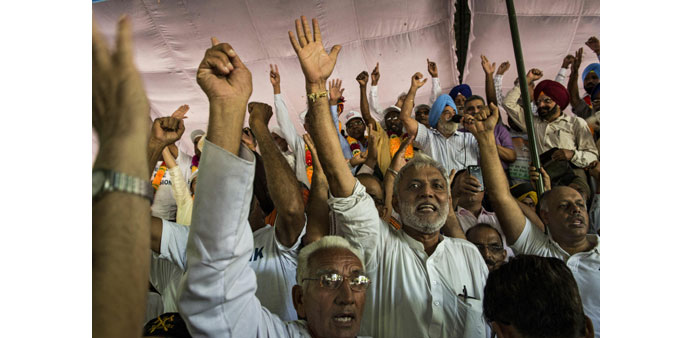Army veterans celebrate following the government’s announcement that it will accept One Rank One Pension (OROP) reforms in New Delhi yesterday.
Agencies/New Delhi
Three million army veterans won a decades-long battle yesterday to change the way their pensions are calculated, as the government bent to protesters’ demands and announced it would overhaul the controversial scheme.
India’s armed forces personnel, who typically retire earlier than other public sector workers, have mounted fierce opposition in recent months to the current pension scheme, which is based on their salary when they retire.
They argue this leaves them vulnerable to inflation eroding their livelihoods and say it is unfair that a soldier who retired recently should receive a larger pension than one who left service earlier.
Under the newly agreed ‘One Rank, One Pension’ (OROP) deal, ex-servicemen will now receive a pension based on 2013 salaries, to be re-fixed every five years - irrespective of when they retired.
“The main argument for OROP is that the defence personnel retire early and thus are not able to get the benefits of serving till normal retirement age,” Defence Minister Manohar Parrikar told a press conference in New Delhi yesterday.
“Despite the huge fiscal burden, given its commitment to the welfare of ex-servicemen the government has taken the decision to implement OROP.”
The scheme will cost between Rs80bn and Rs100bn ($1.2bn - $1.5bn), he said. Military pensioners will receive arrears dating back to July 2014.
“It is a matter of deep anguish that the various governments remained ambivalent on the issue of OROP,” Parrikar said. “Prime Minister Shri (Narendra) Modi has fulfilled his commitment and approved OROP for Armed Forces personnel.”
“Now that the issue of OROP is hopefully behind us, I appeal to the veterans to continue to contribute to the vital task of nation building and development,” Parrikar said.
Veterans have fought for the OROP scheme for four decades but protests have intensified in recent months, with ongoing rallies in New Delhi and several pensioners going on hunger strike.
Reaction to the government’s announcement was mixed, with veterans welcoming the breakthrough in negotiations but also expressing disappointment at certain clauses.
“We welcome the implementation of the scheme,” V K Gandhi, general secretary of the Indian Ex-Servicemen Movement, told reporters at the protest site in Delhi.
“But this isn’t a black and white situation. We want clarification on issues like voluntary retirement,” he said. The government said yesterday that army personnel who take voluntary retirement will not be eligible for the new pensions.
Elsewhere, however, the mood was celebratory. In Jaipur, capital of Rajasthan state, retired army men were pictured exchanging sweets and hugging each other.
Approving the scheme could be a political boon to Modi, whose ruling Bharatiya Janata Party (BJP) enjoys broad support in the military.
Introducing OROP was one of Modi’s key pledges as he led BJP’s successful campaign for last year’s general election.
But some observers say the move could open the door for workers in other state-run industries such as railways to demand similar reforms.
India has one of the world’s largest armies, with around 1.32mn active personnel and 2.14mn reservists.
Retirement ages vary by rank, ranging from 56 to 62 years of age, according to the Indian Army website.

